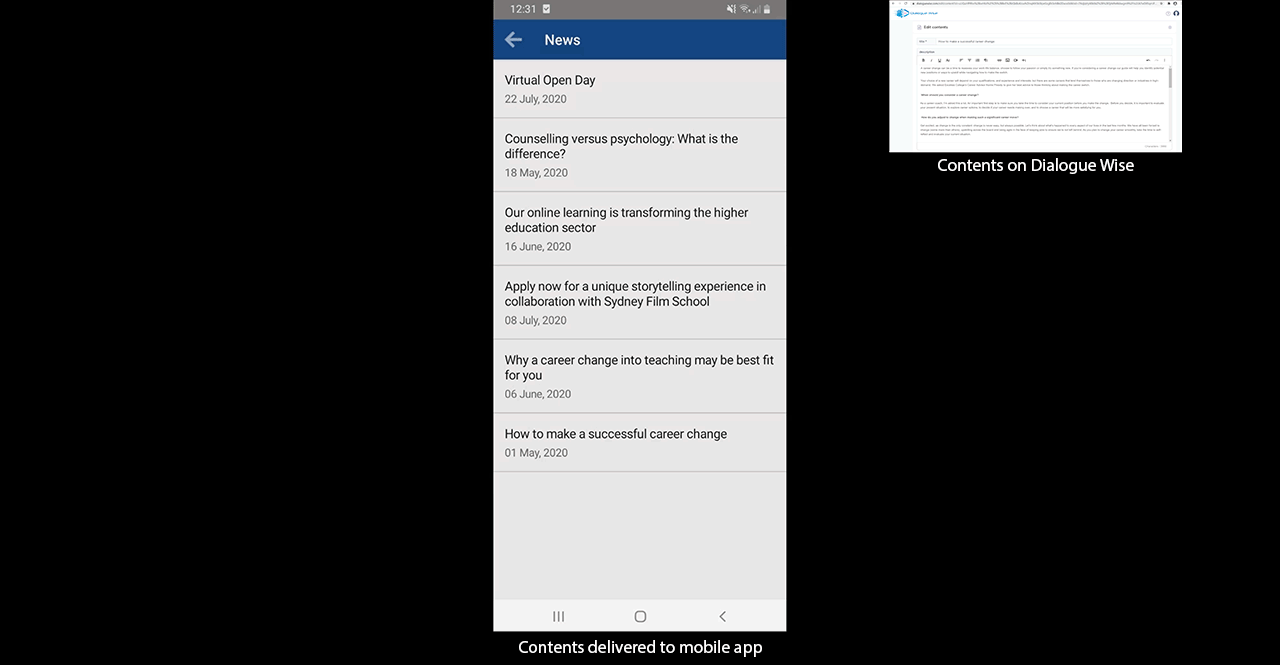POSTS
- 5 minutes readWhether you’re looking to build your own app, or you’re simply interested in the growing field, we’re exploring the benefits of a mobile app content management system (CMS). With the aid of technological advancements, when it comes to effectively and efficiently managing content, the task has never been simpler.
Consider you have a mobile app for your fitness business. With photos, meal plans and fitness routines, you may opt to have content stored inside the app itself or stored in a database. Regardless of the option you select, both present significant challenges when the time comes to add new information and update pre-existing content.
What Are the Challenges of Operating a Mobile App Without A Content Management System?
Whilst the nature of these challenges differs depending on the specificities of your mobile app, there are several which may occur.
-
After each content update, it’s not uncommon for the app owner to resubmit the application to an app store. Presenting serious delays, it’s safe to say that significant time, effort and money is lost in the process. Not to mention, the increased size of the app based on the new addition of content may present another challenge in itself.
-
In most cases, businesses will have their apps on the Google Play Store as well as Apple’s App Store, catering to both the Android and iOS market. This means business owners may find themselves doing double the work when it comes to updating and storing their content.
-
Alternatively, if you choose a database to store your content, you’ll need to run database scripts manually or build another interface to manage the addition of new content. Both options require additional costs as well as an increased workload for the developers and thus, a delayed delivery.
-
Plus, you’ll also need to have separate, non-production environments to test changes before they go live which will include further costs and time.
-
In cases where you have a website operating alongside an app, you’ll need two versions to suit both the phone and website versions. In these cases, content needs to be maintained in two places, requiring increased costs.
When considering the challenges of not using mobile CMS, it’s clear why choosing a content management system to assist in the operation of a mobile app is becoming an increasingly attractive option. After all, being overwhelmed with content is somewhat inevitable within the hyper connected world we now live in.
How Can You Manage Your Content in The Best Way Possible?
When it comes to the most effective and efficient solution for managing a mobile app’s content, there’s an array of solutions on offer.
1. Build Your Own Custom Backend
Building a custom backend for content management is an ideal option for a specific project. Tailored to the project requirement, this solution advantageously requires no compromises.
However, there are obvious downsides. Custom backends can be expensive and require significant maintenance. Plus, they also require resources which aren’t always available. It’s also important to remember that whilst the solution may initially seem like a simple one, problems can start appearing further down the road which may undermine this solutions effectiveness.
That’s why understanding your needs and personal preferences is essential to choosing the right solution for you!
2. Use Mobile Backend as a Service (MBaaS)
MBaaS refers to a system where the service provider supports and powers the backend services of an app. Attending to all the technicalities associated with an app, this service can make a developers life a whole lot easier.
As an article explains, “Mobile Backend-as-a-Service or MBaaS was born to allow mobile developers who were short on time and wanted to build solutions by taking advantage of the latest features in a mobile device as well as manage complex service commands” (2017).
Several products within this space include Google’s Firebase, Apple’s CloudKit, and Kinvey. Features include authentication, Realtime Database and Cloud Messaging.
Suitable for apps which aren’t content rich, MBaaS is ideal for apps which don’t involve significant content work. Mostly developer-focused and highly technical, MBaaS can be unsuitable for content creators and editors.
However, they’re great if you’re looking to put together a minimum viable product (MVP) whilst cutting development time and costs.
How An API-Based Content Management System Can Help Your Mobile App
A fairly new alternative, using a content management system in combination with a RESTful JSON API can be a great option. This solution is sometimes referred to as ‘Content as a Service’, ‘CaaS’ or ‘headless CMS’.
Headless CMS provides you with significant leverage when it comes to content creation and helpful management features. This solution also delivers content in both a mobile-friendly and website-friendly format.
Plus, headless CMS or API CMS are technology agnostic, which means you can integrate them into any platform, making CMS mobile apps a great option.
As Dialoguewise explains, “By finding a good and robust CMS you can eliminate much of the unnecessary hassle developers have to deal with, allowing them to put their focus and creative energy onto more purposeful assignments” (2019).
What Are The Features We Provide?
Offering an array of beneficial features, some include location-based content delivery and device-based content delivery. Whether you’re looking for custom content for the locations you need or you’re wanting to show specific content for websites and shorter versions on a mobile, we have the solution for you!
We’ve included a sample demonstration for you. From efficient content integration to a user-friendly experience, it’s clear that a headless CMS offers many benefits when it comes to assisting you with your mobile app.
